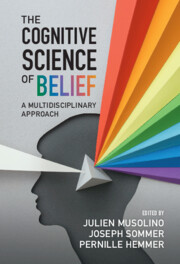Book contents
- The Cognitive Science of Belief
- The Cognitive Science of Belief
- Copyright page
- Contents
- Figures and Tables
- Contributors
- Chapter 1 Introduction
- Part I Understanding Belief
- Part II Domains of Beliefs
- Part III Variation in Beliefs
- Pathological Beliefs
- Individual Differences in Beliefs
- Environmental Effects on Beliefs
- Toward Better Beliefs
- Chapter 25 Training Can Improve Decision Making
- Chapter 26 Building Better Beliefs through Actively Open-Minded Thinking
- Index
- References
Chapter 25 - Training Can Improve Decision Making
from Toward Better Beliefs
Published online by Cambridge University Press: 03 November 2022
- The Cognitive Science of Belief
- The Cognitive Science of Belief
- Copyright page
- Contents
- Figures and Tables
- Contributors
- Chapter 1 Introduction
- Part I Understanding Belief
- Part II Domains of Beliefs
- Part III Variation in Beliefs
- Pathological Beliefs
- Individual Differences in Beliefs
- Environmental Effects on Beliefs
- Toward Better Beliefs
- Chapter 25 Training Can Improve Decision Making
- Chapter 26 Building Better Beliefs through Actively Open-Minded Thinking
- Index
- References
Summary
Research in judgment and decision making has made a lot of progress on the front of the identification of biases, and, more recently, on their correction, by suggesting feasible interventions to reduce their prevalence. Despite initial mixed results, more recent research has revealed that training is a promising debiasing tool. One-shot training interventions can reduce the incidence of several cognitive biases up to three months post training. These effects generalize to decisions and problems that were not featured in the training but are susceptible to the same biases. They were also observed in a field setting when trainees were not able to connect the decision problems to the training. Although the complexity of the decision strategies taught and the propensity of trainees to see themselves as immune to bias may pose boundary conditions to the occurrence of these effects, training has notable advantages in comparison to other debiasing tools such as incentives, accountability, and nudges.
Keywords
- Type
- Chapter
- Information
- The Cognitive Science of BeliefA Multidisciplinary Approach, pp. 557 - 573Publisher: Cambridge University PressPrint publication year: 2022
References
- 1
- Cited by

